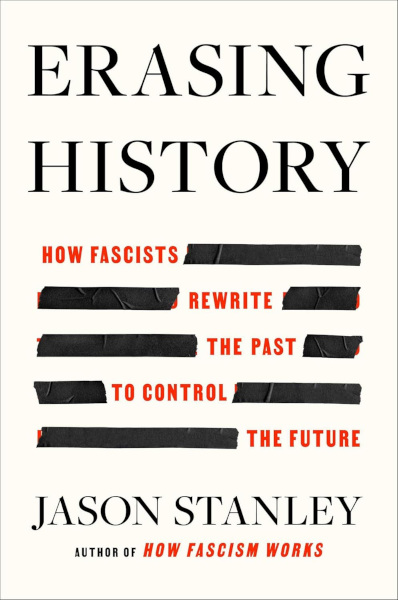From Draft NOtices, July-September 2025
Book Review
Erasing History
How Fascists Rewrite the Past to Control the Future
Jason Stanley
Atria/One Signal, 2024
— Isidro Ortiz

On June 27, the U.S Supreme Court by a 6-3 vote issued a decision allowing parents to opt their elementary school children out of engaging with LGBTQ books in the classroom. On the surface this ruling might seem to be a simple case of religious parents who want to protect their children. Jason Stanley's book encourages us to envision these parents' challenge as part of a rising global fascist movement that has made targets of the public schools and institutions of higher education.
Stanley brings strong credentials and a deep commitment to democracy to the task of illuminating this movement. A professor of philosophy at Yale University and the author of How Fascism Works, Stanley has studied and written widely on authoritarianism, democracy, propaganda, free speech and mass incarceration. Although a member of the faculty at an elite institution, he is no ivory tower intellectual. In the concluding chapter he issues a call to action, specifically activism to protect democracy.
Readers searching for an accessible, insightful, timely and urgent discussion of the global fascist movement will find this work informative, engaging and stimulating. Stanley identifies the scope of the fascist movement, its adherents, supporters and promoters, placing the U.S. movement in a larger global context and highlighting parallels among the iterations of the movement around the world. In addition, he illuminates the agenda, tools, themes and narratives of fascist education. He also identifies the strategies of the fascist movement play book, enabling the reader to understand the advent of developments, such as Project 2025, the attack on diversity, equity and inclusion, and the attack on LGBQT curriculum, showing how they all fit into the fascist juggernaut.
The achievement of these tasks is a major contribution. But for me as a public educator, the most significant contribution Stanley makes is his analysis of why the study of history in public schools and institutions of higher education has come under such a ferocious attack as the fascist movement has surged across national borders. History, as recently taught, challenges fascist myths. For example, regarding labor history Stanley writes: “Labor history is only one of the many perspectives that challenge American fascist myths.” In the case of ethnic studies, women's studies and LGBTQ studies: “students and teachers confront a story of America that is inconsistent with the myths of national innocence and national purity” and “learn that history is not just the history of men, . . . that it is not just the history of the straight and cisgendered.” Although Stanley does not explicitly claim it, his discussion suggests that such myths are elements of the culture of militarism.
For Stanley, the triumph of fascism is not assured in the U.S. or elsewhere. He concludes it can be stopped by social movement organizations and highlights the Zinn Education Project as one example. And though he does not specifically identify COMD and Project YANO, their counter militarism politics would qualify them as among the movement organizations that Stanley would regard as critical as we move forward.
As fascist politics in the United States manifest themselves in developments such as the deployment of National Guard troops and U.S. Marines to Los Angeles, Stanley's work is a must read for all who seek to understand fascism and are concerned with protecting American democracy.
This article is from Draft NOtices, the newsletter of the Committee Opposed to Militarism and the Draft (https://www.comdsd.org/).